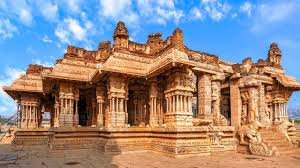
Kashi Vishwanath Temple, located in the sacred city of Varanasi, stands as one of the most revered and iconic temples dedicated to Lord Shiva. As one of the twelve Jyotirlingas, the temple holds profound religious significance for millions of Hindus worldwide. Pilgrims flock to this ancient temple seeking spiritual enlightenment and divine blessings.
In this blog, we explore the temple’s fascinating history, why people visit, the beliefs surrounding it, the funds it generates, and its overall importance in India’s cultural and spiritual fabric.
A Glimpse Into History
- Ancient Origins
The history of Kashi Vishwanath Temple stretches back thousands of years. It is said to have been constructed by Lord Shiva himself, as mentioned in ancient scriptures. The temple has been a symbol of divine energy and spiritual awakening for devotees.
- Demolitions and Reconstructions
Over centuries, the temple faced repeated invasions and demolitions. During the 12th century, the temple was destroyed by Qutb-ud-din Aibak. Despite this, it was rebuilt several times, showcasing the unwavering devotion of Hindus.
In 1780, Ahilyabai Holkar, the queen of Indore, took the initiative to reconstruct the temple in its current form. Her efforts preserved the temple’s sanctity and restored its status as a major pilgrimage site.
- A Symbol of Resilience
Despite its turbulent history, the temple has endured as a beacon of faith and resilience. Each reconstruction has strengthened its cultural and spiritual significance, making it a true testament to the enduring power of devotion.
Why Do People Visit Kashi Vishwanath Temple?
- Seeking Divine Blessings
Devotees believe that visiting the temple and offering prayers to Lord Shiva fulfills their wishes and brings peace. They see the temple as a gateway to spiritual awakening.
- Performing Rituals
The temple plays a central role in many Hindu rituals. Devotees often perform Abhishek (ritualistic bathing of the Jyotirlinga) to seek blessings for themselves and their families.
- The Ganga Connection
Kashi Vishwanath Temple’s proximity to the sacred River Ganga enhances its appeal. Many visitors take a holy dip in the river before offering prayers at the temple, believing this purifies their soul and mind.
- Spiritual Energy
The temple’s atmosphere is filled with chants, prayers, and the ringing of bells, creating a spiritual energy that uplifts every visitor. Many devotees describe their visit as a transformative experience.
Beliefs Surrounding Kashi Vishwanath Temple
- A Path to Moksha
Hindus believe that a visit to Kashi Vishwanath Temple helps one attain Moksha, or liberation from the cycle of birth and rebirth. They see the temple as a place where the soul finds eternal peace.
- Blessings from Lord Shiva
The Jyotirlinga at Kashi Vishwanath is believed to hold immense divine power. Devotees trust that their prayers here reach Lord Shiva directly, granting them protection and prosperity.
- The Eternal City
Varanasi, also known as Kashi, is considered the oldest living city in the world. Believers hold that Lord Shiva himself resides here, making the temple and the city eternally sacred.
- A Center for Rituals
The temple is integral to Hindu rites and ceremonies. From weddings to final rites, Kashi Vishwanath Temple plays a significant role in various stages of a devotee’s life.
Funds and Their Role
- Revenue Generation
The temple receives substantial funds from offerings, donations, and ritual fees. Devotees from around the world contribute generously as an act of devotion.
- Infrastructure Maintenance
These funds are used to maintain the temple’s infrastructure. Regular renovations ensure that the temple retains its sanctity and can accommodate the ever-growing number of visitors.
- Community Support
The temple trust invests in local community development projects. These include educational programs, healthcare facilities, and welfare initiatives that benefit the residents of Varanasi.
- Economic Impact
Kashi Vishwanath Temple significantly boosts the local economy. Vendors, artisans, and service providers rely on the influx of pilgrims for their livelihoods. The funds generated indirectly support numerous families.
Importance of Kashi Vishwanath Temple
- Religious Significance
As a Jyotirlinga, the temple holds immense religious value. It serves as a spiritual anchor for millions of Hindus, offering a space for prayer, meditation, and rituals.
- Architectural Marvel
The temple’s intricate architecture, adorned with gold-plated domes and carvings, reflects India’s artistic heritage. It stands as a visual and spiritual marvel, attracting devotees and tourists alike.
- Cultural Heritage
Kashi Vishwanath Temple embodies India’s rich cultural and spiritual traditions. It connects the past and present, preserving rituals and beliefs passed down through generations.
- Global Recognition
The temple is not only a religious landmark but also a symbol of India’s spiritual identity. It attracts devotees, scholars, and travelers from around the globe, enhancing its global significance.
How to Reach Kashi Vishwanath Temple
- By Air
The nearest airport is Lal Bahadur Shastri International Airport, located about 25 kilometers from Varanasi. Taxis and buses provide easy access to the city center and the temple.
- By Train
Varanasi Junction, one of India’s major railway stations, connects the city to various parts of the country. From the station, visitors can take a rickshaw or taxi to the temple.
- By Road
Varanasi is well-connected by road. State transport and private buses operate frequently, making it convenient for pilgrims to visit the city.
A Journey Beyond the Divine
Visiting Kashi Vishwanath Temple is more than a spiritual experience. The temple’s vibrant atmosphere, combined with the city’s historical charm, leaves visitors in awe. As devotees walk through the narrow lanes of Varanasi to reach the temple, they encounter bustling markets, local traditions, and a deep sense of spirituality.
Participating in rituals like the Ganga Aarti adds to the experience. Standing by the river, watching the priests perform the aarti with lamps and chants, fills one’s heart with devotion. For many, this experience becomes a cherished memory.
The temple also provides an opportunity to reflect on life’s deeper meaning. Surrounded by the energy of countless prayers and the timeless beauty of Varanasi, visitors often feel a profound connection with the divine.
Conclusion
Kashi Vishwanath Temple stands as a testament to India’s spiritual and cultural richness. Its history, steeped in resilience and devotion, inspires millions to embark on a pilgrimage to this sacred Jyotirlinga.
The temple’s spiritual energy, architectural beauty, and role in community development make it a cornerstone of India’s religious landscape. Whether you visit for prayers, rituals, or to explore Varanasi’s timeless charm, Kashi Vishwanath Temple offers an experience that touches the soul.
For those seeking spiritual awakening, cultural exploration, or simply a deeper connection with the divine, this temple is truly a journey worth taking.





